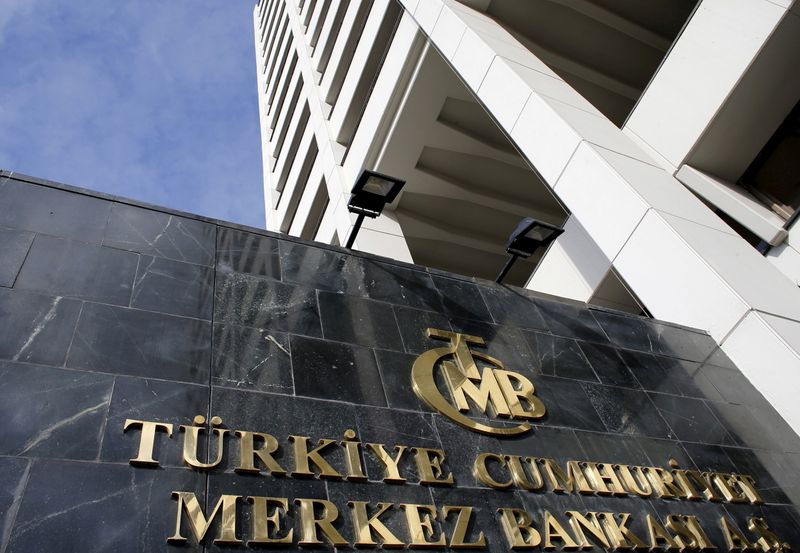By Ali Kucukgocmen and Jonathan Spicer
ISTANBUL (Reuters) -Turkey’s central bank held rates steady at 19% as expected on Thursday and dropped a pledge to tighten policy further if needed, in its first decision since President Tayyip Erdogan fired the hawkish former governor and sparked a market selloff.
In a statement, the bank also ditched last month’s pledge to “decisively” maintain a tight monetary policy “for an extended period” to address inflation, which has risen above 16% and been in double-digits for most of the last four years.
The lira slipped as much as 0.7% to 8.125 versus the dollar after the bank under new governor Sahap Kavcioglu replaced the hawkish guidance with a softer assessment of risks to inflation that analysts said signalled interest rate cuts were on the way.
Erdogan’s shock removal last month of Kavcioglu’s predecessor Naci Agbal, a respected policy hawk, sent foreign investors fleeing from Turkish assets on concerns that rates would be quickly slashed.
But Kavcioglu – who had previously criticised Agbal’s rate hikes – has since promised no abrupt changes. Those assurances as well as the more-than 10% lira selloff had convinced analysts that policy would remain steady for now.
The central bank said it maintained a tight stance in the face of lofty inflation expectations, adding rates would remain above inflation until it is clear that price pressure is easing.
John Hardy, FX strategy head at Saxo Bank, said the currency had weakened on Thursday because Agbal’s pledges were scrapped.
“Any daylight they see, they are going to want to cut rates. Holding them here (today) is just an acknowledgment they can’t get away with it for now,” he said.
In a Reuters poll, most economists had predicted no change to the one-week policy rate this week, but saw easing from around mid-year, to settle at 15% by year-end.
UNORTHODOX MONETARY VIEW
Last month, the central bank under Agbal had raised rates by a more-than-expected 200 basis points to levels last touched in mid-2019 to dampen inflation and support the currency.
Before taking the job, Kavcioglu had said such a policy was wrong for Turkey and also espoused Erdogan’s unorthodox view that high rates cause inflation.
Erdogan has repeatedly called for monetary stimulus to help the economic rebound. He has fired three bank chiefs in two years, eroding monetary credibility.
The lira plunged 15% immediately after Agbal’s dismissal before a rebound, and foreign investors dumped the most bonds and stocks in 15 years over the following week.
Depreciation boosts inflation via imports, delaying any rate cut plans, analysts say.
Inflation is expected to reach as much as 19% before mid-year. Yet few analysts see another rate hike given Erdogan’s repeated calls for stimulus – including one this month for single-digit rates.
The change in tone under Kavcioglu reflects “preparation being made to cut the policy rate,” said Haluk Burumcekci of Istanbul-based Burumcekci Consulting.
Ratings agencies say premature easing could again hammer the lira and raise risks of a balance-of-payments crisis given Turkey’s depleted FX reserves and its $160 billion in short-term foreign debt.
Citing sources, Reuters reported Erdogan ousted Agbal in part because he was uncomfortable with the bank’s investigation into some $128 billion in FX sales undertaken during his son-in-law Berat Albayrak’s stint as finance minister.
(Additional reporting by Daren Butler, Ece Toksabay, Ezgi Erkoyun, Nevzat Devranoglu and Marc Jones; Editing by Gareth Jones and Catherine Evans)
























